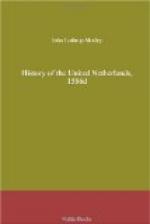Thus the mercantile community, and especially the patrician families of Holland and Zeeland, all engaged in trade, became more and more hostile to the governor-general and to his financial trio, who were soon almost as unpopular as the famous Consults of Cardinal Granvelle had been. It was the custom of the States to consider the men who surrounded the Earl as needy and unprincipled renegades and adventurers. It was the policy of his advisers to represent the merchants and the States—which mainly consisted of, or were controlled by merchants—as a body of corrupt, selfish, greedy money-getters.
The calumnies put in circulation against the States by Reingault and his associates grew at last so outrageous, and the prejudice created in the mind of Leicester and his immediate English adherents so intense, that it was rendered necessary for the States, of Holland and Zeeland to write to their agent Ortell in London, that he might forestall the effect of these perpetual misrepresentations on her Majesty’s government. Leicester, on the other hand, under the inspiration; of his artful advisers, was vehement in his entreaties that Ortell should be sent away from England.
The ablest and busiest of the opposition-party, the “nimblest head” in the States-General was the ex-Advocate of Holland; Paul Buys. This man was then the foremost statesman in, the Netherlands. He had been the firmest friend to the English alliance; he had resigned his office when the States were-offering the sovereignty to France, and had been on the point of taking service in Denmark. He had afterwards been prominent in the legation which offered the sovereignty to Elizabeth, and, for a long time, had been the most firm, earnest, and eloquent advocate of the English policy. Leicester had originally courted him, caressed him, especially recommended him to the Queen’s favour, given him money—as he said, “two hundred pounds sterling thick at a time”—and openly pronounced him to be “in ability above all men.” “No man hath ever sought a man,” he said, “as I have sought P. B.”
The period of their friendship was, however, very brief. Before many weeks had passed there was no vituperative epithet that Leicester was not in the daily habit of bestowing upon Paul. The Earl’s vocabulary of abuse was not a limited one, but he exhausted it on the head of the Advocate. He lacked at last words and breath to utter what was like him. He pronounced his former friend “a very dangerous man, altogether hated of the people and the States;”—“a lewd sinner, nursled in revolutions; a most covetous, bribing fellow, caring for nothing but to bear the sway and grow rich;”—“a man who had played many parts, both lewd and audacious;”—“a very knave, a traitor to his country;”—“the most ungrateful wretch alive, a hater of the Queen and of all the English; a most unthankful man to her Majesty; a practiser to make himself rich and great, and nobody else;”—“among all villains the greatest;”— “a bolsterer of all papists and ill men, a dissembler, a devil, an atheist,” a “most naughty man, and a most notorious drunkard in the worst degree.”




